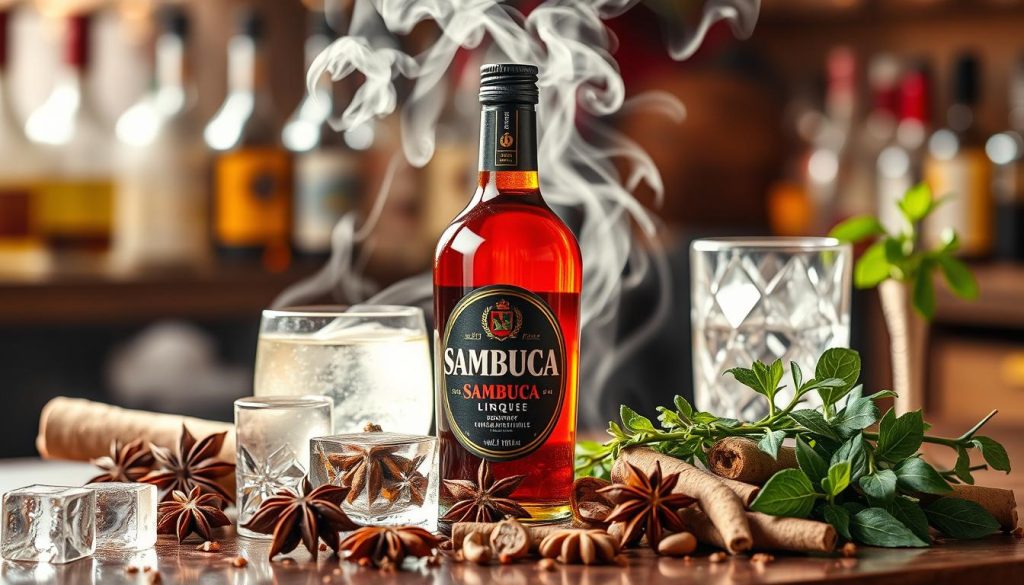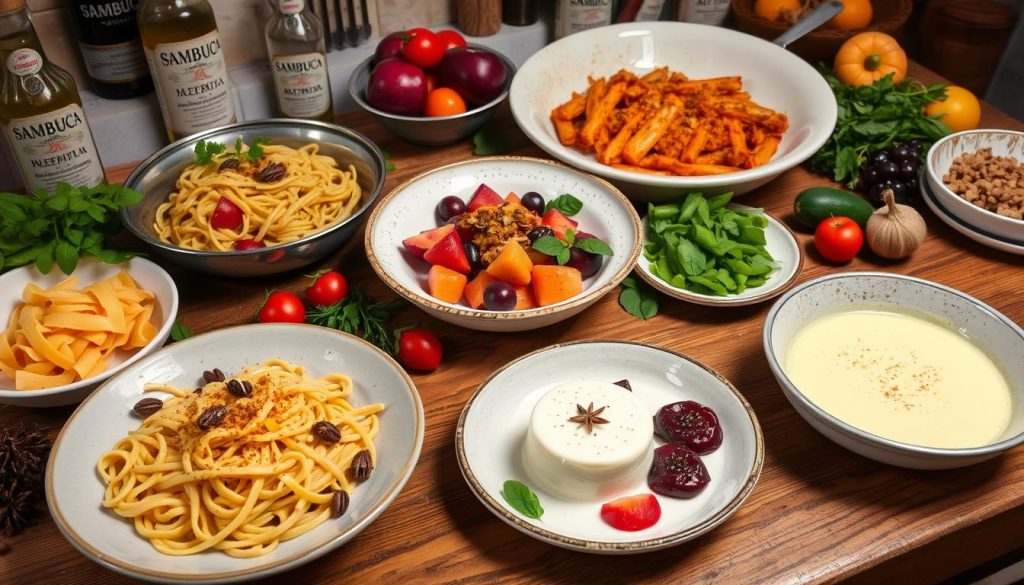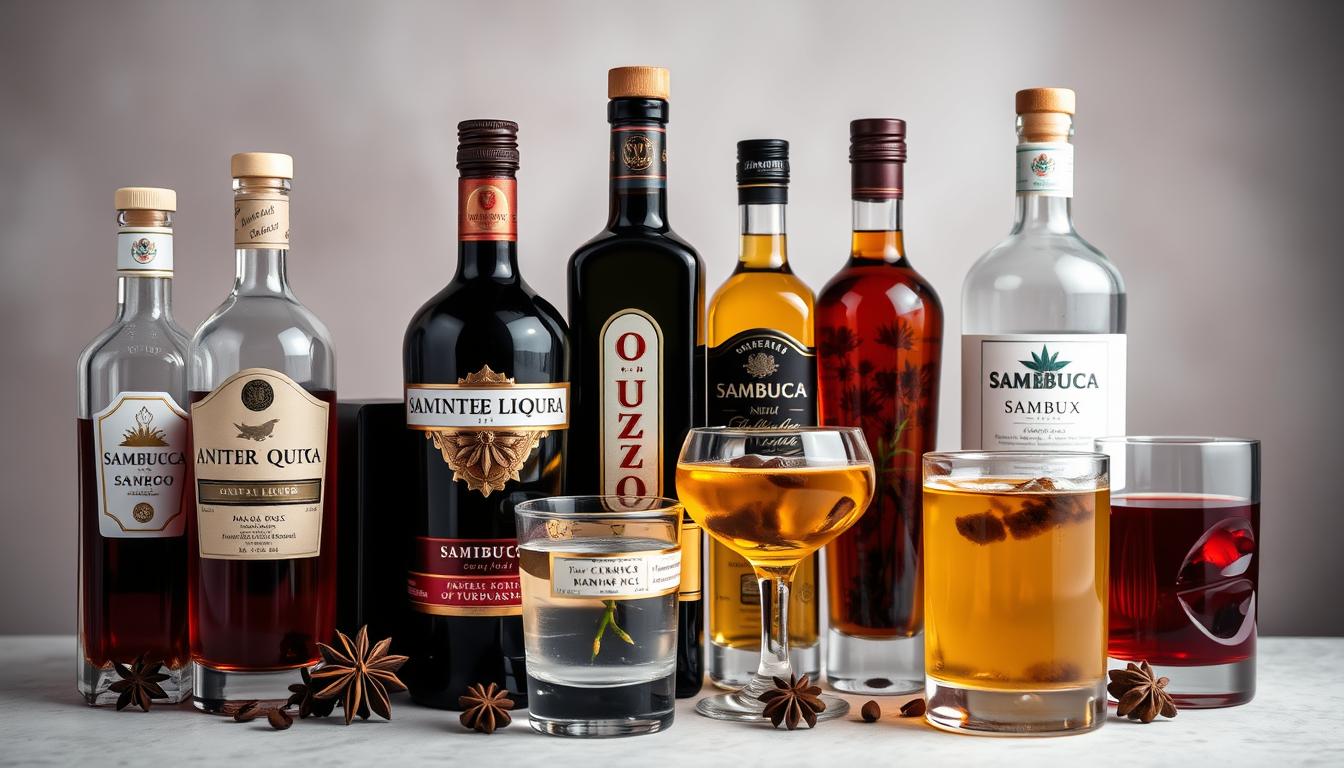Without sambuca, knowing its unique taste is key. This Italian liqueur is known for its sweet anise flavor. It usually has 38% to 42% alcohol.
This guide will show you the best sambuca substitutes. We’ll look at options that match its flavor. You’ll learn about Ouzo, Pastis, and herbal choices like Green Chartreuse.
Each substitute has its own taste. They can be great for making cocktails or cooking. Our guide will help you find the right anise flavor, even without sambuca.
Understanding Sambuca
Sambuca is a key Italian liqueur known for its distinct anise flavor. It has a rich history and several types to explore. Its popularity has made it a favorite in both Italy and around the world.
History and Origin
The story of sambuca began in the mid-19th century, with its creation in 1895. It quickly became popular globally in the 20th century. It’s often served with three coffee beans, symbolizing health, happiness, and prosperity.
Sambuca Characteristics
Sambuca is known for its sweetness and strong anise taste, similar to licorice. It has an alcohol content of 38% to 42%. People enjoy it as a digestif after meals. Its clear appearance and aroma make it great for sipping or mixing in cocktails.
Types of Sambuca
There are many types of sambuca to try. Here are a few:
- White Sambuca: The classic, clear version.
- Black Sambuca: Has a deeper licorice taste and color, often with elderflower and other herbs.
- Red Sambuca: Has a sweeter, fruitier taste, perfect for those who prefer a different flavor.
Each type keeps the anise flavor but offers a unique taste. This shows how versatile sambuca is in the world of liqueurs.
Exploring Sambuca Substitute Guide
Sambuca is an Italian liqueur known for its strong anise flavor. Finding substitutes can open up new possibilities in your drinks and cooking. Here, we’ll look at different types of substitutes, each with its own unique taste.
Similar Liqueurs
Looking for something with a similar anise taste to sambuca? There are several liqueurs that can fill the gap. Here are a few:
- Ouzo: A Greek liqueur with a strong anise flavor, great for cocktails or enjoying on its own.
- Pastis: From France, Pastis turns milky when mixed with water. It has a distinct aniseed flavor.
- Arak: Popular in Middle Eastern cuisine, Arak adds an anise flavor to drinks and dishes.
- Anisette: An anise-flavored liqueur, Anisette is sweeter than sambuca.
Herbal Substitutes
Want to try something different from sambuca’s anise taste? Herbal substitutes can add complex flavors. Here are a couple:
- Green Chartreuse: A liqueur with a mix of herbs and spices, adding depth to cocktails.
- Yellow Chartreuse: Sweeter than Green Chartreuse, it has a milder flavor.
Non-Anise Alternatives
Need something without an anise flavor? Non-anise liqueurs can help. They can add variety to your cocktails without losing flavor:
- Amaretto: A sweet, nutty liqueur that adds a unique twist to cocktails.
- Limoncello: A zesty, sweet Italian lemon liqueur, great for brightening drinks or desserts.
- Galliano: A blend of vanilla and anise, adding a rich aroma to any drink.
Flavor Profile Considerations
Understanding flavor profiles is key when substituting sambuca. It can make your cocktails and cooking better. Aspects like anise flavor, sweetness, and alcohol content are important for taste and balance.
Anise Flavor Matching
Matching the anise flavor of sambuca is crucial. Liqueurs like Pernod and Ouzo have strong anise tastes. They can keep your recipes or cocktails tasting right.
For those who don’t drink alcohol, anise extract or fennel seed infusion work well. They offer a similar taste, useful in many dishes.
Sweetness Adjustment
Sambuca is sweet, thanks to sugar or honey. If your substitute isn’t sweet, add sugar, honey, or syrup. This way, your drinks or dishes will taste just right, keeping the sambuca flavor.
Alcohol Content Balance
Sambuca’s alcohol is between 38-42% ABV. Knowing this is important when picking substitutes. You might need to adjust how much you use to keep the drink balanced. This is true for both drinks and cooking.

Using Sambuca Substitutes in Cooking
Adding sambuca substitutes to your cooking can make flavors pop and open up new recipe ideas. Sweet and savory dishes both get a boost from sambuca’s unique taste. Learning how to swap it out safely lets you get creative in the kitchen.
Desserts and Sweet Dishes
Sambuca’s anise flavor can make desserts shine. For cooking with sambuca, try using Ouzo or Anisette as substitutes. These can make ice creams and custards even better. Use them one-to-one, but adjust to taste to keep the dish balanced. Here are some ideas for desserts:
- Ouzo for anise flavor
- Anisette for sweetness
- Vanilla extract as a milder substitute
Trying these sambuca substitutes in desserts can create exciting new tastes. It keeps your recipes’ essential qualities while introducing something new.
Savory Dishes and Marinades
Sambuca is great in savory dishes too. It’s perfect for marinades or deglazing pans to boost flavors. Herbsaint or Pastis can replace sambuca in savory dishes, adding to the Mediterranean taste. Here are some tips for marinades:
- Herbsaint adds an herbal note
- Pastis brings a sweet, anise flavor
- Dilution with water or broth can adjust strength
Choosing the right sambuca substitutes can really improve the taste of savory dishes. It ensures all ingredients work well together. Follow these cooking tips to get the most out of your dishes.

Conclusion
In this guide, you’ve found many sambuca substitutes. These can make your cocktails and dishes better. You can use Pernod, Ouzo, and Absinthe to get the sambuca taste or try something new.
These substitutes come in herbal liqueurs and non-alcoholic options. So, there’s something for everyone, no matter the occasion.
Using sambuca substitutes can make your cocktails and dishes more exciting. Just remember to match the sweetness and anise flavor. Adjust the alcohol content to keep your recipes just right.
Now, you’re ready to explore new flavors. Enjoy the journey and celebrate the taste of sambuca!
Source Links
- https://thekitchencommunity.org/sambuca-substitutes/
- https://spiritsirens.com/2019/01/17/arak-and-many-more/
- https://bespokeunit.com/spirits/sambuca/
- https://makemeacocktail.com/ingredient/13/sambuca
- https://amoretti.com/products/sambuca?srsltid=AfmBOorykHCn4POJUgDnrukoT355VPVz9vcIdRkaHpXo76msMOuUJ8jQ
- https://mytour.vn/en/blog/bai-viet/exploring-sambuca-a-guide.html
- https://casadesante.com/blogs/wellness/best-pernod-substitutes?srsltid=AfmBOoq-lXlADMr4sL-m5Z77ccD3U0qT4vsH1uLXYCupJfmidB3U3sTk
- https://discover.texasrealfood.com/swap-and-savor/anise/aniseed-substitutes
- https://frugalhausfrau.com/ingredients/alcoholwine-substitutes/non-alcoholic-substitutes/
- https://www.recipetips.com/kitchen-tips/t–904/alcohol-substitutions.asp
- https://www.alsothecrumbsplease.com/pernod-substitute/
- https://www.savorysuitcase.com/sambuca-substitutes/
- https://www.mothersalwaysright.com/top-alcohol-shots-you-need-to-experience/
